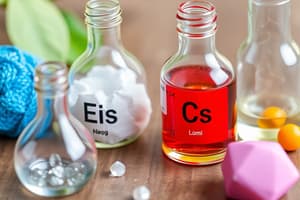Podcast
Questions and Answers
What defines a compound in chemistry?
What defines a compound in chemistry?
- A mixture of two or more elements not chemically bonded.
- An elemental form that cannot be broken down chemically.
- A pure substance made up of atoms of two or more elements. (correct)
- A pure substance made entirely of one element.
Which particle is found in the nucleus of an atom?
Which particle is found in the nucleus of an atom?
- Neutrons (correct)
- Ions
- Electrons
- Photons
How many energy levels can an atom have?
How many energy levels can an atom have?
- Nine energy levels
- Four energy levels
- Seven energy levels (correct)
- Five energy levels
What is the maximum number of electrons that the K energy level can hold?
What is the maximum number of electrons that the K energy level can hold?
What describes neutrons in an atom?
What describes neutrons in an atom?
What characteristic is true for electrons in an atom?
What characteristic is true for electrons in an atom?
What happens to the properties of matter when the atomic structure changes?
What happens to the properties of matter when the atomic structure changes?
Why is the nucleus considered to contain most of the mass of an atom?
Why is the nucleus considered to contain most of the mass of an atom?
Flashcards are hidden until you start studying
Study Notes
Composition of Matter
- Everything in the universe is made of matter
- Matter takes up space and has mass
- Mass refers to the quantity of matter in an object
- Weight refers to the pull of gravity on an object
Elements
- Pure substances that cannot be broken down chemically
- More than 100 elements exist
Compounds
- Most elements do not exist by themselves
- Elements readily combine with other elements in a predictable fashion
- A compound is a pure substance made of two or more elements
- Compounds have a fixed proportion of atoms
Atoms
- The simplest particle of an element that retains all its properties
- Atomic properties determine the structure and properties of matter they compose
- Our understanding of atomic structure is based on scientific evidence
The Nucleus
- Found at the center of the atom
- Consists of protons (positively charged) and neutrons (no charge)
- Makes up most of the atom's mass
Protons
- All atoms of an element have the same number of protons
- The number of protons is balanced by an equal number of electrons
Neutrons
- The number of neutrons can vary slightly between atoms of the same element
- Neutrons have no charge
Electrons
- Negatively charged particles with little mass
- Travel at high speeds at various distances from the nucleus
- The distance of an electron from the nucleus is determined by it's energy level
Electronic Configuration
- Electrons are distributed across energy levels and sub-shells (orbitals)
Energy Levels
-
Atoms have seven energy levels
-
These levels are designated as K (closest to the nucleus) through Q (furthest from the nucleus)
-
The K level can only hold 2 electrons
-
The L level can hold 8 electrons
-
Electrons at the same energy level are roughly the same distance from the nucleus
-
Outer energy levels have more energy than inner energy levels
Sub shells (Atomic Orbitals)
- Each energy level is made up of one or more sub-shells
- Sub-shells are composed of atomic orbitals
Studying That Suits You
Use AI to generate personalized quizzes and flashcards to suit your learning preferences.




